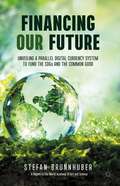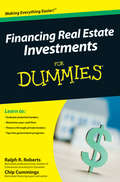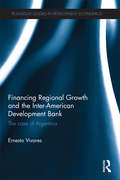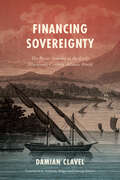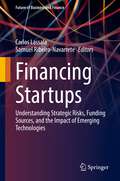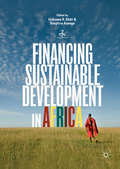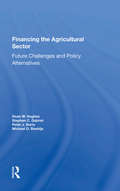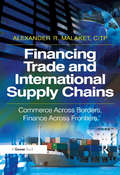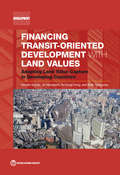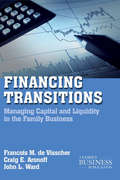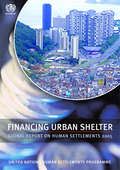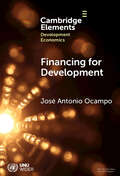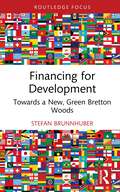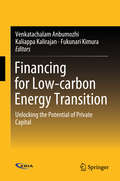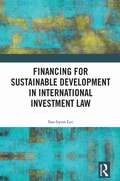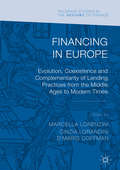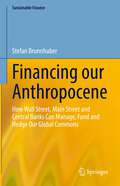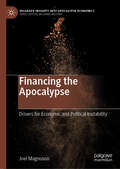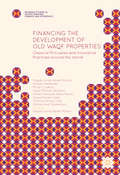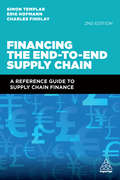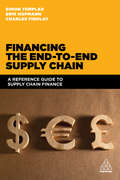- Table View
- List View
Financing Our Future: Unveiling a Parallel Digital Currency System to Fund the SDGs and the Common Good
by Stefan BrunnhuberThe monetary system is the indispensable missing link in the debate of sustainability, and whether the current financial system can handle these evolved needs. To date, the UN Sustainable Development Goals (SDGs) primarily have been financed either through the private sector, through conventional public sector taxes and fees, or through philanthropic commitment. Assuming a need of 4 to 5 trillion dollars annually in the 10 to 15 years left to finance our future, these conventional sources of finance are insufficient in terms of both the scale and speed of funding required to finance our future. Furthermore, the inherent instability of our financial system forces the world community to focus first and foremost on repairing and stabilizing the existing system. The development of cryptocurrencies using distributed ledger technologies (mainly blockchain) has prompted leading central banks to study the potential application of this approach to independently create purchasing power. In this vein, this book offers a new approach, namely introducing a parallel electronic currency specifically designed to finance global common goods and provide the resources necessary to achieve the SDGs. Furthermore, this mechanism would have a stabilizing effect on the existing monetary system. The book argues that one way this could be achieved is by giving central banks a modified monetary mandate to inject new liquidity into the system using a top-down approach. Alternatively, liquidity could come from corporate or communal initiatives with crypto- or communal currencies in a bottom-up approach. The author maintains that by issuing a blockchain-enabled parallel electronic currency earmarked for SDG-related projects and using other channels for monetary flow rather than the conventional ones, the future could be financed in a different manner. In the long run, abandoning our current monetary monoculture and introducing a monetary ecosystem would stabilize international financial markets, increase monetary regulatory efforts, reduce negative externalities, create a social Pareto optimum and stabilize democracies. This book presents, in the same spirit as Fritjof Capra’s The Tao of Physics, a Tao of finance—an outside-of-the-box approach to financing global common goods.
Financing PPL Corp.'s Growth Strategy
by Benjamin C. Esty Carrie FermanPPL Corp., an electric utility in Pennsylvania, needs to finance $1 billion of peaking plants as part of its new growth strategy. In February 2001, Steve May, director of finance for PPL's Global Division, is responsible for recommending a finance plan. After considering all the options, May decides that a synthetic lease is the best option, but he must decide whether to recommend a traditional or a limited recourse synthetic lease and how to structure the specific terms. The limited synthetic lease, in contrast to the traditional structure, requires a smaller corporate guarantee on the assets and has greater off-credit treatment, which is important given the company's growth strategy and limited debt capacity. However, finding investors willing to accept greater project risk will cost more and take more time. Timing is an issue for May because if he doesn't close the financing within the next two months, PPL will lose a valuable option to buy turbines for its peaking plants. Failure to exercise the option could delay the company's construction schedule, something PPL wants to avoid given the nationwide race to build new generating plants.
Financing Real Estate Investments For Dummies
by Joe Kraynak Ralph R. Roberts Chip CummingsYour practical guide to scoring cash to fuel your real estate investments Want to be a smart, successful real estate investor? This no-nonsense guide contains everything you must know to make the right choices about financing your investments - from the various options available and the impact on cash flow to the tax implications and risk factors involved. You also get tried-and-true tips for surviving a down market and using current investments to finance future ones. A crash course in real estate financing - understand standard terms and concepts, learn the various sources of investment capital, and gather all essential facts and figures Weigh your options - decide which type of financing is best for your circumstances and incorporate it into your real estate investing plan Finance residential properties - evaluate residential loan programs, navigate the loan application and processing, and handle the closing Invest in commercial properties - know the different property types, choose the one that meets your investment goals, and discover unique sources for financing Tap into unconventional sources - discover the pros and cons of "hard money," capitalize on seller financing, partner to share risk and equity, and invest on the cheap with no-money-down deals Open the book and find: Real-world advice on financing without tying up all your capital How to get prequalified or preapproved for a loan Questions to ask your lender upfront Ways to avoid common beginner blunders How to protect your personal assets from investment risks Bargain-hunting hints for low-cost loans Strategies for surviving a credit crunch Ten pre-closing steps you must take
Financing Regional Growth and the Inter-American Development Bank: The Case of Argentina (Routledge Studies in Development Economics #101)
by Ernesto VivaresThe crisis of the current global financial order is challenging us to critically reflect on how this order has been driven, and the development outcomes produced by its central political and economic actors. There is a great deal of academic knowledge about the role of the international financial institutions, powerful states and capital markets in international development, but there is little understanding of how regional dynamics and regional institutions influence global governance and developing countries. This book offers an independent and grounded investigation concerning the political economic role of Regional Development Banks through a study of the world’s leading regional development bank, the Inter-American Development Bank (IDB). The book examines the political economy of the IDB and its role in regional and national development during the neoliberalisation processes of the 1990s. In particular, the investigations explore the IDB’s power in regional and national development – via its technical, political and financial interventions – to frame policy alternatives, absorb opposition forces, support specific coalition forces and justify a particular direction of development, all in order to legitimize specific political economic projects directed by market-led pro-reform coalitions aligned with global financial forces and financial development guidelines. This book will be relevant to scholars and professionals interested in the international and regional political economy of development financing.
Financing Residential Real Estate (15th edition)
by Megan Dorsey David RockwellFinancing Residential Real Estate has earned a reputation in the real estate community as the most up-to-date, comprehensive, and clearly written book in its field.
Financing Sovereignty: The Poyais Scandal in the Early Nineteenth-Century Atlantic World
by Damian ClavelFinancing Sovereignty rewrites the story of one of the great financial frauds of the nineteenth century: Gregor MacGregor, a Scottish mercenary and self-proclaimed cacique of Poyais, borrowed massive sums on the City of London's burgeoning South American sovereign debt market by selling bonds of the State of Poyais. The only problem—Poyais did not exist. At least, that is what MacGregor was quickly accused of by the press and public opinion at the time. From then on, MacGregor has embodied the figure of the swindler par excellence, the con artist behind the most audacious financial fraud in history. In Damian Clavel's deeply researched retelling of the Poyais story, MacGregor is less an unscrupulous adventurer aiming to defraud English investors than a luckless intermediary between Indigenous Miskitu elites and British financiers. From the coasts of Moskitia to the trading floors of London, Clavel traces the genesis, development, and downfall of the Poyais project, detailing how these events were the outcome of a failed attempt to finance the making of a new country in Central America. A microhistory set against the backdrop of global history, Financing Sovereignty offers a new lens through which to view the political, economic, legal, and social dynamics of the nineteenth-century revolutionary, financial, and imperial transformations that took place across the Atlantic.
Financing Startups: Understanding Strategic Risks, Funding Sources, and the Impact of Emerging Technologies (Future of Business and Finance)
by Carlos Lassala Samuel Ribeiro-NavarreteThere is no doubt that the proliferation of entrepreneurial activity is a current trend. Start-ups enable an effective transformation of knowledge, generating high added value to society. The objective of this book is to address the financing of the entrepreneurial process as a necessary element to articulate a solid business fabric, based on taking advantage of new opportunities. The book is structured in two parts. The first part takes as a reference the lack of financing in the entrepreneurship process and analyses different sources of financing available to entrepreneurs depending on the phase in which the project is located. The second part of the book analyses innovation and its links to the financing of start-ups, addressing the impact of emerging technologies and fintech services and the support of artificial intelligence. Finally, the book concludes with an examination of decentralized finance (DeFi), as an idea that is changing the financial world, giving rise to new financial paradigms.
Financing Sustainable Development in Africa
by Uchenna R. Efobi Simplice AsonguThis edited volume provides a critical evaluation of financing options for sustainable development in Africa. While sustainability has long been the watchword for development programs, and while many African countries have taken initiatives to develop integrated frameworks that tackle developmental challenges—including poverty, education, and health—financing has remained a challenge. In this book, an expert team of chapter authors examines new financing options while also exploring how traditional financing means, such as foreign aid and foreign direct investment, can be more effective for sustainability. The authors discuss how African nations can build adequate structures and productive capacity to create a platform that can meet present economic, social, and environmental needs without compromising the ability of future generations to meet their own needs. Practical case studies and scientific evidence give this book a unique approach that is both qualitative and quantitative. This book will be of interest to students, practitioners, and scholars of development studies, public policy and African economics.
Financing Sustainable Development: Key Challenges and Prospects (Palgrave Studies in Impact Finance)
by Bruno S. Sergi Magdalena ZioloThis book is among the first to address the issue of assessing the efficiency of sustainable development financing from a theoretical and methodical point of view. The innovative nature of research is expressed through the study of new phenomena in finance including sustainable financial systems, sustainable finance, ESG risk and individual and institutional motivations of financial managers in the sustainability concept. The book aims to draw attention to the significant gap in the existing research.The concept of Sustainable Development, if placed in an economic category, requires a lot of attention, but seeing the cognitive category from the perspective of the discipline of finance, the latter is unsatisfactory, with questions remaining unanswered. At the same time, the rank problem, its strategic dimension and the amount of financial resources allocated and disbursed for the purposes of focusing around sustainable development, identification of financial phenomena accompanying this category is seen as a priority. Most measures financing Sustainable Development and measures of public spending efficiency are measures subject to rigor and rules due to their specificity, which means actions aimed at increasing efficiency are treated as a priority. This book will be of interest to leading representatives of academia, practitioners, executives, officials, and graduate students in economics, finance, management, statistics, law and political sciences.
Financing The Agricultural Sector: Future Challenges And Policy Alternatives
by Dean W. HughesFarm credit and tax policies have become increasingly important areas of concern for policymakers and agriculturists. Rising levels of debt use among the nation's commercial producers, rising interest rates, and an increased dependence on international commodity markets have contributed to greater income volatility at the farm level, making financi
Financing Trade and International Supply Chains: Commerce Across Borders, Finance Across Frontiers
by Alexander R. MalaketThe vast majority of international trade is supported by some form of trade financing: a specialized, sometimes complex form of financing that is poorly understood even by bankers and seasoned finance and treasury experts. Financing Trade and International Supply Chains takes the mystery out of trade and supply chain finance, providing a practical, straightforward overview of a discipline that is fundamental to the successful conduct of trade: trade that contributes to the creation of economic value, poverty reduction and international development, while increasing prosperity across the globe. The book suggests that every trade or supply chain finance solution, no matter how elaborate, addresses some combination of four elements: facilitation of secure and timely payment, effective mitigation of risk, provision of financing and liquidity, and facilitation of transactional and financial information flow. The book includes observations on the effective use of traditional mechanisms such as Documentary Letters of Credit, as well as an overview of emerging supply chain finance solutions and programs, critical to the financing of strategic suppliers and other members of complex supply chain ecosystems. The important role of export credit agencies and international financial institutions is explored, and innovations such as the Bank Payment Obligation are addressed in detail. Financing Trade and International Supply Chains is a valuable resource for practitioners, business executives, entrepreneurs and others involved in international commerce and trade. This book balances concept with practical insight, and can help protect the financial interests of companies pursuing opportunity in international markets.
Financing Transit-Oriented Development with Land Values
by Hiroaki Suzuki Beth Tamayose Jin Murakami Yu-Hung HongCities in developing countries are experiencing unprecedented urban growth. Unfortunately, this is often accompanied by the negative impacts of sprawl as a result of rapid motorization such as congestion, air pollution, greenhouse gas emissions, inefficient use of energy and time, and unequal accessibility. As these cities are often under severe fiscal constraints, they face great challenges in financing capital-intensive mass transit systems to reverse the course of these negative trends. Development-based land value capture (DBLVC) financing schemes being practiced in Asian megacities like Hong Kong SAR, China, and Tokyo have helped them not only to generate funds for transit investment and operational and maintenance costs but also to promote sustainable urban development through transit-oriented development (TOD). Many rapidly growing cities in developing countries have the conditions for introducing DBLVC " namely, strong economic growth, rising real incomes and increased motorization and congestion levels " all of which cause land value appreciation within proximity of transit stations or corridors. If adapted well to local contexts, DBLVC schemes have great potential to become an important strategic apparatus of urban finance and planning for cities in developing countries. Through a careful analysis of various case studies, this book provides strategies, policies, and methodologies that policy makers and practitioners can apply in developing their own DBLVC schemes for transit financing.
Financing Transitions: Managing Capital and Liquidity in the Family Business (A Family Business Publication)
by John L. Ward François M. de Visscher Craig AronoffThis book establishes the principles and patterns necessary to laying the foundation for capital and liquidity planning. Through an in-depth examination of financial situations, it leads family businesses to making wise, well-timed choices about the future of the business and the family.
Financing Urban Shelter: Global Report on Human Settlements 2005
by Un-Habitat'Achieving the goals set by world leaders in the United Nations Millennium Declaration will be difficult without a significant improvement in the lives of slum dwellers, and the lives of slum dwellers cannot be improved without the sound and sustainable economic development that is conducive to the establishment of a strong shelter sector. As Financing Urban Shelter: Global Report on Human Settlements 2005 emphasizes, one of the key challenges in meeting the Millennium Declaration Goal on slums is mobilization of the financial resources necessary for both slum upgrading and slum prevention by supplying new housing affordable to lower income groups on a large scale. . . . It is my hope that, by highlighting the impacts of current shelter financing systems on low-income households and by identifying the types of financing mechanisms that appear to have worked for them, this report will contribute to the efforts of the wide range of actors involved in improving the lives of slum dwellers, including governments at the central and local levels, as well as non-governmental and international organizations.' From the Foreword by KOFI ANNAN, Secretary-General, United Nations Financing Urban Shelter presents the first global assessment of housing finance systems, placing shelter and urban development challenges within the overall context of macroeconomic policies. The report describes and analyses housing finance conditions and trends in all regions of the world, including formal housing finance mechanisms, microfinance and community funding, highlighting their relevance to the upgrading of slums. Recent shelter finance policy development is discussed at the international and national levels, and the directions that could be taken to strengthen shelter finance systems are examined. The Global Report on Human Settlements is the most authoritative and up-to-date assessment of conditions and trends in the world's cities. It is an essential tool and reference for researchers, academics, public authorities and civil society organizations around the world. The preceding issues of the Global Report on Human Settlements have addressed such topics as An Urbanizing World, Cities in a Globalizing World and The Challenge of Slums. Published with UN-HABITAT
Financing for Development: The Global Agenda (Elements in Development Economics)
by José Antonio OcampoThe reform of the international financial and tax systems has been at the center of global debates in recent years –in the United Nations, the World Bank, the International Monetary Fund, the OECD and the G20. The fourth United Nations Conference on Financing for Development that will take place in Spain in 2025 also represents a great opportunity to enhance global cooperation in this area. This Element analyzes six elements of the global financing for development agenda, which are dealt with in individual sections: the role and evolution of development financing; the international monetary system; sovereign debt restructuring; international tax cooperation; international trade; and critical institutional issues. Although focusing on the international agenda, many of these issues have domestic implications for developing countries. The analysis covers both the nature of cooperation and recommendations on how to improve it. This title is also available as Open Access on Cambridge Core.
Financing for Development: Towards a New, Green Bretton Woods (Routledge Focus on Economics and Finance)
by Stefan BrunnhuberThis book provides a robust argument for an upgrade of the financial system to enable a more sustainable approach. It explores the upcoming debate on a newly modified international financial architecture, facing serial ecological crisis and the advent of new technologies, and which operates in a multipolar world.Instead of business as usual (BAU) scenarios, it explores new, innovative, out of the box approaches in the following arenas: taxonomy and regulation, including capital flow management measures and taxations schemas; financial engineering such as hedging instruments private public partnerships; and polity frameworks e.g. IMF, World Bank, Multilateral development banks, voting quota. It addresses the new role of Central Bank Digital Currencies (CBDCs), the current and upcoming campaign on debt restructuring, as well as the role of new technologies - AI and Blockchain - to tackle illicit financial transactions and fraud, including predictive coding and big DATA correlations. The book focuses on the new role of monetary regulators and central bankers in providing conditioned, additional liquidity to finance, hedge and manage our global commons and to mobilize private capital at the same time, meaning that monetary policy will oversteer fiscal and credit policy in a Bretton Woods II process. The author argues that a new green Bretton Woods 2.0 will provide the agenda to transform our economy and our society, and a Green Transition plan is included in the book.This will serve as a comprehensive reader for students, scholars and activists in the fields of macroeconomics, international development policy, finance and sustainability. It will also appeal to policy makers and executives in the financial sector as well as informed monetary experts.
Financing for Low-carbon Energy Transition: Unlocking the Potential of Private Capital
by Venkatachalam Anbumozhi Kaliappa Kalirajan Fukunari KimuraThis book is the first comprehensive assessment of the state of low-carbon investments in Asia, analyzing the rationales, mandates and public–private financing activities. Based on the experiences of several regional initiatives wherein public financing is catalyzing private investments in low-carbon infrastructure, this book proposes a framework that can be used as a tool to identify factors that influence private investment decisions and policy instruments that can scale up the private capital.Placing the Asian economies onto a low-carbon development pathway requires an unprecedented shift in investments. This book addresses this situation by asking questions such as: • What is the central role of private finance in achieving the Paris Agreement targets? • What key policy levers and risk mitigation can governments use in an effort to unlock the potentials of private capital? • How can regionally coordinated actions hold significant promise for scaling up private investments?
Financing for Sustainable Development in International Investment Law
by Soo-hyun LeeThis book highlights the intersection between international investment law and sustainable development, particularly in the context of the right to regulate for public interest related to sustainable development.Addressing key challenges hindering the harmony between investment law and sustainable development, the book unveils a new methodology to assess whether a government measure or foreign investment contributes to sustainable development. The primary question driving this text is: how should investment treaty arbitration tribunals evaluate the sustainable development impact of both government measures and foreign investments affected by those measures? Beginning by establishing a conceptual framework around the right to regulate for public interest, the book also identifies limitations in the typical approach taken in investment treaty arbitration. Additionally, broader systemic constraints within international investment law concerning sustainable development are discussed.This book will be of interest to students and scholars in the field of international investment law, economic law, and sustainable development.
Financing in Europe: Evolution, Coexistence And Complementarity Of Lending Practices From The Middle Ages To Modern Times (Palgrave Studies in the History of Finance)
by Marcella Lorenzini Cinzia Lorandini D’Maris CoffmanThis book explores the evolution of credit and financing in Europe from the Middle Ages through to Modern Times. It engages with the distinct political, economic and institutional frameworks of the examined areas (England, Italy, France, Germany, Spain, the Netherlands and Turkey) and discusses how these affected the credit market. It covers a wide range of different types of lending and borrowing instruments, the destination of capital, the way it was raised, and the impact it had on local or national economies in a very long run.Presented in two parts, part one of the book focuses on credit markets in the preindustrial age, in particular the period before the advent of modern joint stock banks. Part two examines the evolution of credit at the time of the emergence of modern banks. This volume will be of interest to academics and researchers in the field of finance who are interested in the historic evolution of credit and the credit market.
Financing our Anthropocene: How Wall Street, Main Street and Central Banks Can Manage, Fund and Hedge Our Global Commons (Sustainable Finance)
by Stefan BrunnhuberDevelopment needs to meet the UN SDG have primarily been financed through private sector financing, conventional public sector funding and philanthropic commitment. These sources are not sufficient in scale and speed to meet the pressing finance needs. The world community is too busy repairing, stabilizing, and refunding the system to maintain the stability of the existing system. The introduction of a parallel electronic currency specifically designed to finance global commons, and a human-centred economy would provide the necessary resources to achieve the UN SDGs while stabilizing the existing monetary system.This book analyses how the development of cryptocurrencies based on blockchain distributed ledger technologies has prompted leading central banks around the world to study the potential application of this approach to directly inject purchasing power without dependence on the banking system. Furthermore, the book illustrates how this approach can be utilized to finance the huge multi-trillion dollar annual investment requirements for achieving the Sustainable Development Goals (SDG).With a Foreword from the President of the Club of Rome.“This book is where fiction turns into fact.” - World Bestselling Author of ‚The Minister of the Future‘ Stan Robinson“…challenging, innovative and interdisciplinary… to address the world’s problems.” - Founder and Father of the Quantitative Easing (QE), Prof. Dr. Richard Werner, Oxford University, GB“The real tragedy of the commons, as this book shows, is that we have allowed the most valuable social resources, our money and legal systems, to be employed for private gain instead of mobilizing them for social goals, not the least to ensure the survival of the human species on this planet.” - Best-selling author of ‚The code of capital’ Katharina Pistor, Edwin B. Parker Professor of Comparative Law and Director, Center on Global Legal Transformation Columbia Law School, USA
Financing the Apocalypse: Drivers For Economic And Political Instability (Palgrave Insights Into Apocalypse Economics Ser.)
by Joel MagnusonAs we tour the 400 year history of capitalism through its various phases of development, financial system instability is always there lurking in the shadows. The historical record attests that the processes of aggregating capital for real investment are inescapably vulnerable to risk, manic speculation, unserviceable debt, and crises; and with each episode of instability, a trail of devastation follows. Economic historians such as Hyman Minsky, Charles Kindleberger and others have studied this history and have exposed certain boom-bust patterns that have a way of stubbornly repeating themselves. This book posits that the large-scale financial crises that the world has experienced over the last 30 years are more or less the latest segments in this narrative, but with some distinct characteristics. In the period spanning the stock market crash of 1987 to the banking crisis of 2008 and its aftermath – the Greenspan Era – there were key institutional and ideological developments rooted in contemporary neoliberalism that have reshaped the historic rise-and-fall patterns to become more severe and widespread. In this important volume, Magnuson suggests the next episode will be a massive financial cyclone that will send us all tumbling toward a perilous future.
Financing the Business: Where's the Money?
by Richard LueckeThis chapter describes the financing requirements that businesses typically encounter in different phases of the business life cycle, from start-up to maturity. It also provides an overview of the sources they turn to in securing financing during those phases. Two types of business--lifestyle and entrepreneurial--illustrate the general course of financing from start-up through expansion.
Financing the Development of Old Waqf Properties: Classical Principles and Innovative Practices around the World (Palgrave Studies in Islamic Banking, Finance, and Economics)
by Seyed Kazem Sadr Hisham Dafterdar Murat Cizakca Syed Othman Alhabshi Thamina Anwar Mohammed Obaidullah Magda Ismail Mohsin Shaikh Hamzah RazakThis book presents successful case studies in Muslim and Muslim minority countries that have revolutionized the redevelopment of idle waqf properties into productive land trusts. The revival of this institution over the last two decades shows the growing optimism in galvanizing the socioeconomic role of waqf by adopting its flexible shariah measures. Innovative ways of financing redevelopment allow Muslims to extend these roles to include new beneficiaries. New uses for these properties include providing services to the community, opening jobs for the majority of people, funding small entrepreneurs, educating the masses, providing health care, and sheltering the poor and needy. Countries under study include Sudan, Turkey, Malaysia, Indonesia, Singapore, New Zealand, Kuwait, Oman, Qatar, and Iran. Additionally, the book examines the International Development Bank's role in financing the development old waqf properties in different countries.
Financing the End-to-End Supply Chain: A Reference Guide to Supply Chain Finance
by Charles Findlay Erik Hofmann Simon TemplarFinancing the End-to-End Supply Chain provides readers with a comprehensive understanding of the financial synergies across the supply chain. It demonstrates the importance of the strategic relationship between the physical supply of goods and services and the associated financial flows. The book provides a clear introduction, demonstrating the importance of the strategic relationship between supply chain and financial communities within an organization. This book links together treasury, banking, supply chain, systems, IT, and key stakeholders. Financing the End-to-End Supply Chain will help senior supply chain practitioners to build collaboration, improve relationships and enhance trust between supply chain partners. With its combination of theory and practice it tackles vital issues including physical, information and financial flows, and tailoring supply chain finance to individual organisations' circumstances. Recognizing that supply chain finance means different things in different countries, the authors also consider various initiatives to harmonize and develop cross-border financing as well as including an agenda for national and international policy makers. The new edition features interviews from SCF platform providers on how ecosystems are involved in supply chain finance, additional learning activities for students and new examples on working capital management.
Financing the End-to-end Supply Chain: A Reference Guide to Supply Chain Finance
by Charles Findlay Erik Hofmann Simon TemplarFinancing the End to End Supply Chain provides readers with a real insight into the increasingly important area of supply chain finance. The book provides a clear introduction, demonstrating the importance of the strategic relationship between supply chain and financial communities within an organization. It contains vital information on how supply chain finance is operationalised and put into place. It is written in a user-friendly style, starting with the purchasing function, and linking together treasury, banking, supply chain, systems, IT, and key stakeholders. Financing the End to End Supply Chain will help senior supply chain and procurement practitioners to build collaboration, improve relationships and enhance trust between supply chain partners. With its combination of theory and practice it tackles vital issues including physical, information and financial flows, and tailoring supply chain finance to individual organisations' circumstances. Recognising that supply chain finance means different things in different countries, the authors also consider various initiatives to harmonize and develop cross-border financing from the World Bank and other institutions, as well as including an agenda for national and international policy makers.Financing the End to End Supply Chain offers a mix of academic and industrial expertise and is written by three authors who are experts in the field. The book contains ground-breaking research and data from the Cranfield School of Management.
